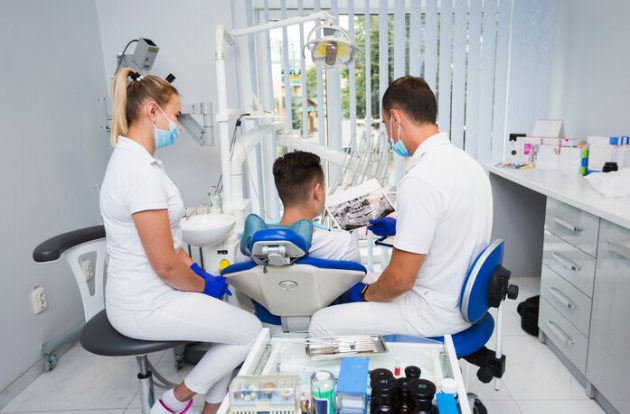A strong, healthy smile goes beyond the appearance of your teeth—it’s also about maintaining the stability of your jaw and overall oral health. Dental crowns play a crucial role in preserving this balance by protecting damaged or weakened teeth. When a tooth is compromised, it can disrupt your bite alignment and put unnecessary strain on your jaw. Over time, this stress may lead to discomfort or even more significant jaw issues.
Dental crowns provide a durable solution, restoring the tooth’s structure, function, and appearance while helping to distribute bite forces evenly. This protection not only safeguards your teeth but also supports the long-term health of your jaw, preventing potential complications. Let’s take a closer look at the benefits crowns bring to your overall oral health.
How do dental crowns support jaw health over time?
Dental crowns provide vital support for jaw health over time through several mechanisms that help maintain dental function and prevent complications. Here’s how they contribute:
- Restoration of Tooth Structure: Crowns restore the shape and size of damaged or decayed teeth, allowing them to withstand normal biting forces. This restoration prevents further deterioration and maintains the tooth’s integrity.
- Preventing Tooth Loss: Crowns help prevent tooth loss by covering and protecting weakened teeth. This can lead to the shifting of adjacent teeth. Preserving the natural tooth structure supports overall dental alignment and stability.
- Support for Bite Function: Crowns ensure proper occlusion by providing a balanced bite. A well-aligned bite is crucial for distributing forces evenly across the jaw, reducing joint and muscle stress.
- Prevention of Jaw Misalignment: When teeth are lost or severely damaged, remaining teeth can shift into the gaps, leading to misalignment. Crowns help maintain proper spacing and alignment of teeth, preventing potential jaw issues.
- Reduced Risk of TMJ Disorders: A stable bite minimizes the risk of temporomandibular joint (TMJ) disorders. By providing structural support and maintaining alignment, crowns contribute to the jaw’s and surrounding structures’ long-term health.
Dental crowns are essential in supporting jaw health by restoring tooth structure, preventing tooth loss, ensuring proper bite function, and reducing the risk of misalignment and TMJ disorders.
What impact do dental crowns have on overall jaw stability?
Dental crowns significantly impact overall jaw stability by supporting damaged or weakened teeth and maintaining proper dental alignment. Here are several key ways in which dental crowns contribute to jaw stability:
- Support for Weakened Teeth: Crowns restore the structural integrity of compromised teeth, allowing them to withstand normal biting forces. This support prevents further deterioration and minimizes the risk of tooth loss.
- Preservation of Tooth Alignment: Crowns help maintain the position of surrounding teeth by covering and protecting teeth. This preservation prevents shifting, which can lead to bite misalignment and associated jaw issues.
- Balanced Bite Function: Crowns play a crucial role in achieving a well-aligned bite. Proper occlusion helps distribute chewing forces evenly across the dental arch, reducing jaw joint and muscle stress.
- Prevention of Bone Loss: When a tooth is lost, the jawbone can deteriorate due to a lack of stimulation. Crowns help preserve the natural tooth structure, stimulate the bone, prevent bone loss, and contribute to overall jaw stability.
- Reduction of TMJ Disorders: Crowns can reduce the likelihood of temporomandibular joint (TMJ) disorders, which are often linked to jaw instability, by maintaining proper alignment and bite function.
Dental crowns enhance overall jaw stability by providing structural support, preserving alignment, balancing bite function, preventing bone loss, and reducing the risk of TMJ disorders.
Can dental crowns prevent future jaw alignment issues?
Yes, dental crowns can significantly prevent future jaw alignment issues by providing essential support and stability to the dental structure. Here are several ways in which crowns contribute to maintaining proper jaw alignment:
- Restoration of Damaged Teeth: Crowns help maintain the natural alignment of the dental arch by restoring the shape and functionality of damaged or decayed teeth. This restoration prevents neighboring teeth from shifting into the gap a damaged tooth leaves.
- Maintenance of Occlusion: Crowns ensure a proper bite by aligning with opposing teeth, which is crucial for balanced occlusion. A well-aligned bite distributes chewing forces evenly, reducing the risk of uneven wear or stress on the jaw.
- Prevention of Tooth Loss: Crowns protect weakened teeth from further damage, reducing the likelihood of tooth loss. When teeth are lost, the remaining teeth may shift, leading to alignment issues.
- Support for Adjacent Teeth: Crowns provide structural support to adjacent teeth, helping to prevent movement or shifting that can disrupt overall alignment and maintain a stable dental arch.
- Reduced Strain on Jaw Joints: Crowns can help alleviate unnecessary strain on the temporomandibular joint (TMJ) by ensuring proper alignment and functionality of teeth, reducing the risk of jaw discomfort or disorders.
Dental crowns can effectively prevent future jaw alignment issues by restoring teeth, maintaining occlusion, preventing tooth loss, supporting adjacent teeth, and reducing strain on jaw joints.
How do dental crowns help maintain long-term dental structure?
Dental crowns are essential in maintaining long-term dental structure by providing protection, support, and functionality to damaged or weakened teeth. Here’s how they contribute to the integrity of dental structure over time:
- Protection Against Further Damage: Crowns encase and shield compromised teeth from additional wear, fractures, or decay. This protective layer helps preserve the underlying tooth structure, extending the tooth’s life.
- Restoration of Functionality: Crowns restore the shape and size of damaged teeth, enabling proper biting and chewing functions. This restoration ensures that teeth can handle normal forces without the risk of further damage.
- Prevention of Tooth Loss: Crowns help prevent tooth loss by reinforcing weakened teeth, which can lead to further structural issues, such as shifting or misalignment of adjacent teeth.
- Maintenance of Tooth Alignment: Crowns help maintain the position of surrounding teeth by preventing movement that can occur when a tooth is compromised or lost. This alignment is crucial for a healthy bite.
- Support for Jaw Structure: Crowns contribute to the overall health of the jawbone by preserving the integrity of the dental arch. A stable dental structure stimulates the jawbone, reducing the risk of bone loss over time.
Dental crowns play a critical role in maintaining long-term dental structure by protecting teeth, restoring functionality, preventing tooth loss, maintaining alignment, and supporting jaw health.
Ensure Your Jaw Health with Dental Crowns Today!
At Gentle Touch Family Dentistry, we prioritize your jaw health and overall well-being. Dental crowns are an excellent solution for restoring damaged or weakened teeth, providing essential support and protection. Covering and reinforcing your natural teeth, crowns help maintain proper bite function and alignment, reducing the risk of future dental issues.
Our experienced team is dedicated to delivering high-quality, personalized care to ensure you receive the best treatment for your needs. Don’t wait until problems arise—consider dental crowns today for a healthier, more confident smile. Contact us to schedule your consultation and take the first step towards optimal oral health!



